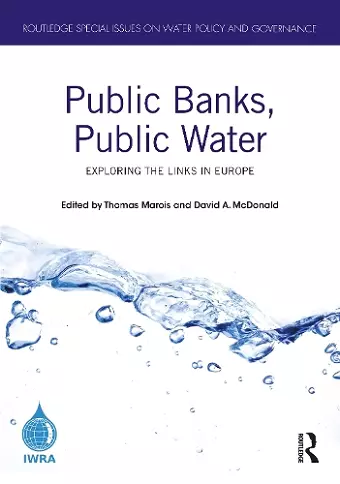Public Banks, Public Water
Exploring the Links in Europe
David A McDonald editor Thomas Marois editor
Format:Hardback
Publisher:Taylor & Francis Ltd
Published:28th Feb '23
Currently unavailable, and unfortunately no date known when it will be back
This hardback is available in another edition too:
- Paperback£38.99(9781032382784)

This book explores the potential for public banks to help finance the expansion, democratization, and sustainability of public water services in Europe, with implications for public water financing elsewhere in the world.
Financing the UN’s Sustainable Development Goal 6 for water and sanitation will be enormously expensive and will also depend largely on public water operators. Where will this money to fund public water services come from? One option is public banks. These state-owned institutions constitute just under 20% of global banking assets, holding close to $50 trillion in assets. Many public banks have explicit mandates to finance public water management and related public goods, and they have been doing so for decades. And yet, despite a resurgence of interest in public banks, their roles and potential in funding public water services have been largely ignored by researchers and policy makers.
This book aims to measure the scale and nature of interactions between public banks and public water operators in the European region; identify challenges and opportunities for deeper engagement between public banks and public water operators; recognize promising practices and how these might be transferred elsewhere in the world; and assess possibilities for more democratic forms of public bank and public water interactions. This volume will be of great use to students and researchers interested in political ecology and economy, development and cooperation, public policy as well as water governance and management.
The chapters in this book were originally published as a special issue of Water International.
This is a unique, and uniquely valuable book. It offers a carefully curated and highly readable collection of essays on the political economy of public water service provision in diverse countries and contexts, written by deeply knowledgeable and engaged authors. They demonstrate that there is enormous potential for progressive forms of financing public services in developing countries, focussing on the essential role of public banks. - Alfredo Saad-Filho, Queen’s University Belfast
How can we achieve Sustainable Development Goal 6 (the provision of clean water and sanitation for all)? This book focuses on public banks, rather than the de-risking of private finance, as a possible solution. Based on detailed case studies in Asia, Africa and Latin America, it makes a convincing normative case for these long-term finance providers to be a viable solution. A must read for development scholars and those studying development banks! - Matthias Thiemann, Full Professor for European Public Policy, Sciences Po Centre des Etudes Europeennes
Public Banks and Public Water in the Global South makes an indispensable contribution to the global fight against privatization. It moves beyond a critique of neoliberal privatization policies, offering examples of how public services can be kept public. A must read for academics, practitioners and activists aspiring to a humane urbanism where life - not profit - is at the center of policy decisions. - Faranak Miraftab, Professor, Department of Urban and Regional Planning, University of Illinois, Urbana Champaign.
This timely book fills an important gap in the burgeoning literature about the exciting prospect of public banks to challenge the power of private capital. Focusing upon the water sector and the global south, the book draws upon a range of fascinating case studies to demonstrate the potential for an ecosystem of public banks at different geographical scales to contribute to an alternative development agenda. - Andrew Cumbers, Professor of Political Economy at the University of Glasgow
At last, here is a book that takes water finance in an exciting new direction. It is an authoritative tour de force on the potential for public banks to supply the large-scale, patient finance needed for sustainable equitable water systems. With a fascinating set of detailed case studies from the global South from an impressive collection of authors from across the globe, this book is a must read for anyone concerned with the dominance of private finance in infrastructure policy, showing us that another way is possible. - Kate Bayliss, Research Associate, SOAS University of London
This edited collection offers insightful and timely empirical analysis regarding the future of water and sanitation systems. The various chapters engage thoughtfully with the thorny questions surrounding the financing of water infrastructure within a context of overlapping financial and environmental crises. Presenting rich and compelling case studies from around the world, the book demonstrates the possibilities for just, equitable and democratic alternatives to private financing.- Meera Karunananthan, Lecturer in the Geography and Environmental Studies at Carleton University and Chair of the Blue Planet Project
Closing the financing gap to meet our Sustainable Development Goals is one of the developmental challenges of our time. This timely book brings the evidence to bear on how public banks are a key component for mobilizing financial resources for the realization of quality public water provision in the Global South. A must read for development practitioners, students and researchers.- Dr. Basani Baloyi, Programme Co-Director, Institute for Economic Justice, South Africa
Public banks are going through a promising resurgence. This book is an excellent contribution to the growing body of empirical research on public banks, showing that they are a potentially transformative vehicle for addressing financial challenges in the Global South, particularly in the water and sanitation sector. It is a must-read for civil society organisations advocating for a change in the current international financial architecture.- Dr. María José Romero, Policy and Advocacy Manager, Development Finance, Eurodad
ISBN: 9781032382777
Dimensions: unknown
Weight: 453g
192 pages